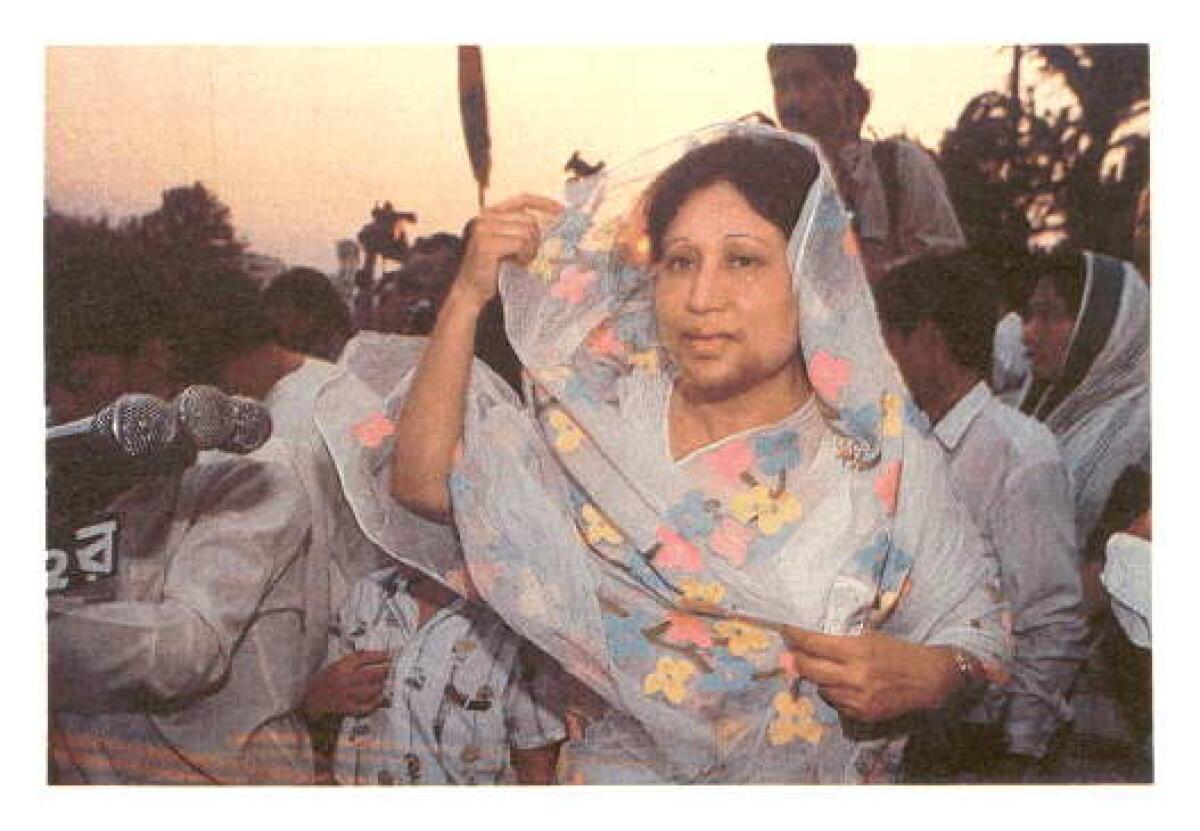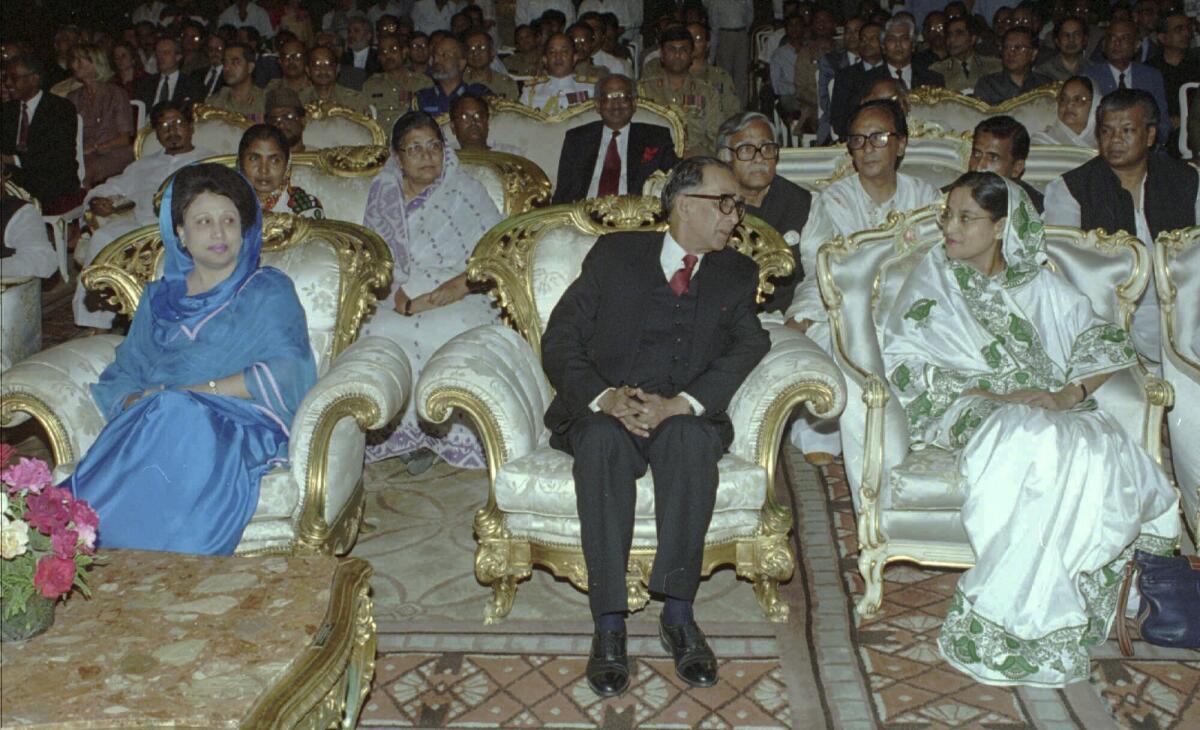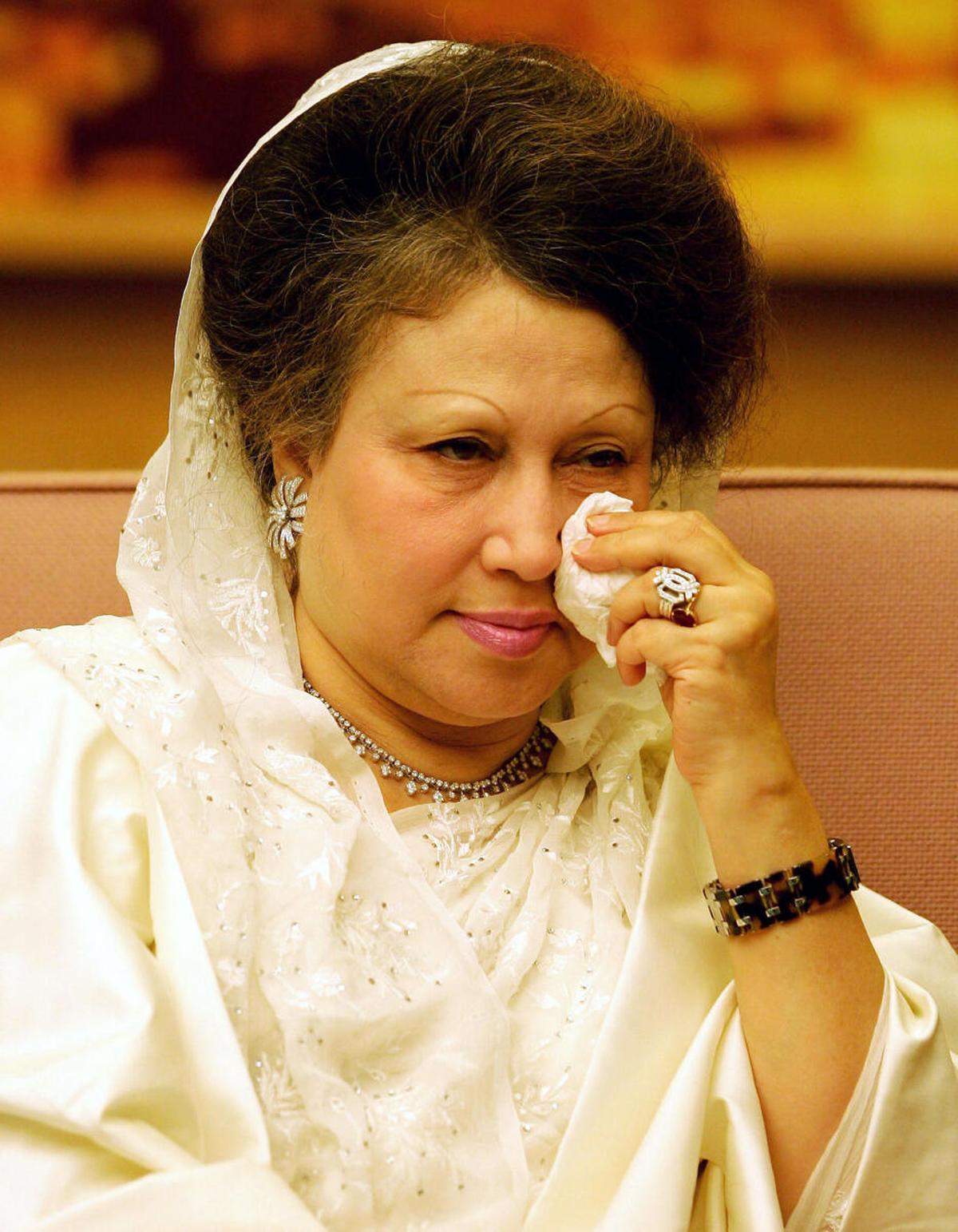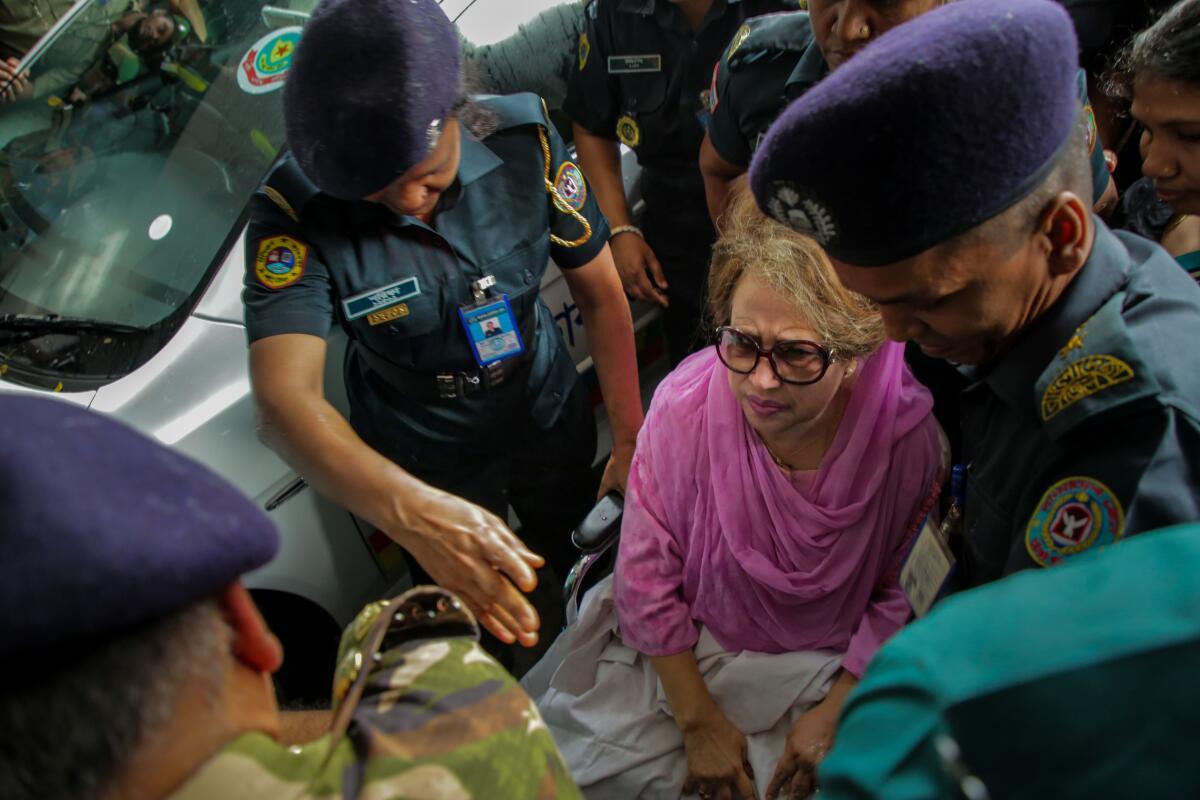The story to this point: On August 6, a day after Sheikh Hasina resigned as Prime Minister and left Bangladesh, Khaleda Zia, the ailing ex-Prime Minister of the South Asian nation of 170 million was launched on President Mohammed Shahabuddin’s orders. The 79-year-old chief of the Bangladesh Nationalist Occasion (BNP) has been underneath home arrest since March 25, 2020, serving a 17-year jail time period in two graft circumstances since February 8, 2018.
Ms. Zia was launched after a gathering held between President Mohammed Shahabuddin, navy chiefs, political events, representatives of civil society and leaders of the Anti-Discrimination Pupil Motion, reported Bangladeshi information outletThe Each day Star. The ex-PM has a number of well being points, together with liver cirrhosis, arthritis, diabetes and coronary heart points.
On this aerial {photograph}, Bangladesh Nationalist Occasion (BNP) activists collect close to a poster of BNP chairperson Khaleda Zia, throughout a rally in Dhaka on August 7, 2024.
In October 2023, the 17-doctor panel treating the BNP chief had claimed that she was at “excessive danger” of dying with out pressing medical intervention overseas. Nevertheless, the Hasina authorities had refused to allow her to depart the nation. As per a conditional launch sanctioned throughout a COVID-19 outbreak, Ms. Zia is just not allowed to depart her residence in Dhaka’s Gulshan space.
With the Bangladesh parliament dissolved, the nation is headed for recent elections to be held underneath a caretaker authorities, a mere six months after Ms. Hasina gained the final one in a landslide.
Right here’s a have a look at Ms. Hasina’s arch-rival Khaleda Zia and her political legacy.
1982: Joins BNP as a member
After the assassination of her husband and former navy president Common Ziaur Rahman in a navy riot, Khaleda Zia entered energetic politics by becoming a member of the BNP and taking cost as vice-president, inside a yr.
1983-1990: Spearheads the anti-Ershad motion
Gen. Rahman was changed by Gen. Hussain Muhammad Ershad, who dominated Bangladesh underneath martial legislation for eight years. Opposing navy rule, Ms. Zia took to the streets alongside together with her get together members to mob the Secretriat constructing in Dhaka. Taking cost as BNP chief in 1984, Ms. Zia headed a number of rallies and protests towards the Ershad regime, which had imposed a stringent curfew, and scrapped social schemes and secular ideas from the Structure.
Stitching a coalition with like-minded Islamic events, Ms. Zia fashioned a ‘seven-party alliance.’ Allying with Sheikh Hasina’s Awami League (AL), which headed a 15-party alliance, and the five-party Left coalition, Ms. Zia demanded an finish to navy rule. She was detained a number of occasions by the police and even positioned underneath home arrest all through the navy rule.

In 1986, when the Ershad regime introduced elections, Ms. Zia demanded the formation of a caretaker authorities to carry ‘free and honest’ polls. Nevertheless, because the navy authorities didn’t accede, the BNP boycotted the polls whereas the AL participated within the elections and emerged as the first Opposition. The newly-elected Parliament lasted solely a yr as all AL members resigned and Ms. Hasina demanded free elections underneath a caretaker authorities.
Because the navy as soon as once more elected Gen. Ershad because the President, Ms. Zia joined arms with Ms. Hasina to launch a nationwide protest demanding an finish to navy rule. Within the face of public outcry, Gen. Ershad resigned in December 1990, passing the cost to appearing President Shahabuddin Ahmed to conducting ‘free and honest’ elections.
1991: First time period as Prime Minister
The elections held on February 27, 1991 elected a ‘impartial’ ‘Jatiya Sangsad’ (nationwide parliament), awarding BNP a slim victory. Successful 141 of the 300 directly-elected parliamentary seats, Ms. Zia was sworn in as Bangladesh’s first girl Prime Minister on March 20, 1991.
Beneath her first time period, a bipartisan legislation – the twelfth modification – was handed by the Parliament to ascertain a parliamentary system in Bangladesh. Beneath this legislation, a Home of directly-elected representatives, a council of ministers headed by the Prime Minister accountable to the Jatiya Sangsad, a constitutional head of state (President) to be voted by the Jatiya Sangsad and an impartial judiciary was established. Her authorities additionally handed legal guidelines to make main training obligatory and set up a coast guard, and in addition launched a free market financial system.

Begum Khaleda Zia at a Bangladesh Nationalist Occasion rally
Nevertheless, her authorities acquired a jolt in 1994, when Ms. Hasina, together with many AL members, resigned from the Parliament, accusing the Zia authorities of widespread corruption and rigging of by-elections. Refusing to move the cost to a caretaker authorities to carry polls, Ms. Zia proposed a non-partisan advisory council headed by the President to supervise elections. With the AL boycotting the 1996 polls, Ms. Zia was re-elected for a second time in an election which noticed solely a 21% voter turnout.
Amid rising calls for for recent elections, Ms. Zia’s authorities handed the thirteenth Modification to the structure, permitting the formation of a impartial caretaker authorities to permit peaceable switch of energy and supply a degree taking part in discipline to all political events throughout elections. After a brief, twelve-day time period, Ms. Zia resigned and handed over energy to a caretaker authorities headed by former Chief Justice Mohammad Habibur Rahman.
1996-2001: First time period as LoP
Bangladesh awarded Ms. Hasina the mandate within the June 1996 polls, with AL profitable 146 of the 300 seats, adopted by BNP, which gained 116 seats, and the Jatiya Nationwide Occasion (JP), led by the then-incarcerated Mr. Ershad, which gained 32 seats.

Former Bangladeshi Prime Minister Khaleda Zia, left, seems over as new interim chief Mohammad Habibur Rahman speaks with opposition Awami League chief Sheikh Hasina, proper, at Rahman’s swearing-in ceremony in Dhaka on Saturday, March 30, 1996
| Photograph Credit score:
AP Photograph/Pavel Rahman
Stitching a four-party alliance with Islamic events like Jamaat-i-Islami Bangladesh, Islami Oikya Jote and Gen. Ershad’s JP, the BNP launched an anti-corruption motion towards the Sheikh Hasina authorities. Forward of the 2001 elections, JP exited the four-party alliance; a splinter faction headed by Naziur Rahman Manju remained with BNP.
2001-2006: Third time period as PM
Within the 2001 elections, the BNP-led four-party alliance gained a landslide victory, profitable 215 seats. Ms. Zia’s time period, nonetheless, was marred by rising Islamic militancy, unchecked corruption, abuse of energy, and erosion of democracy inside BNP. Based on The Each day Star, Ms. Zia had “stacked her get together management and cupboard posts together with her sons, nephews and different family members,” selling widespread nepotism. Along with her two sons in authorities, she allowed extra radical and felony members within the alliance authorities to rule unchecked with minimal accountability, critics alleged.
Ms. Zia’s reported patronage of Siddique ul-Islam alias Bangla Bhai, who was pivotal in forming the militant outfit Jama’atul Mujahideen Bangladesh (JMB), marred her time period in 2005. On August 17, 2005, 469 near-simultaneous bomb blasts occurred in 63 areas throughout Bangladesh, killing two and injuring over 100.

Prime Minister of Bangladesh, Khaleda Zia wipes her eyes throughout a gathering with Chinese language Vice Premier Huang Ju on the Nice Corridor of the Individuals in Beijing, 17 August 2005. Zia arrived in Beijing simply hours after her homeland was rocked by greater than 100 small bombs.
Her aligning with the Jamaat-i-Islami, which had opposed Bangladesh’s independence from Pakistan, additionally precipitated controvesy. Additional, she has declared August 15 – the day when Mujibur Rahman and most of his speedy members of the family have been killed in a navy coup— as her birthdate, which has been thought-about an insult to the Awami League founder who has been named ‘Father of the Nation.’ She has additionally proven no paperwork backing today as her date of beginning and has been slapped with a number of circumstances for questioning Bangladesh’s independence historical past. She has additionally remained skeptical of the variety of martyrs within the liberation conflict.
Throughout her final time period as PM, she carried out free training for ladies, established the Ministry of Liberation Battle Affairs, the Fast Motion Battalion (RAB) and performed free examinations.
2006-2008: Stalemate over caretaker PM and arrest
Forward of the 2006 polls, the BNP and AL did not agree on a candidate to move the caretaker authorities. Ending the stalemate, President Iajuddin Ahmed declared himself as caretaker PM and introduced elections to be held in January 2007. With the AL accusing the caretaker authorities of a bias in direction of the BNP authorities, Sheikh Hasina introduced a boycott of the polls and Bangladesh was positioned underneath a state of emergency.
The military-run authorities headed by then-Military Chief Gen. Moeen U. Ahmed initiated a ‘struggle towards corruption’ and arrested each Ms. Hasina and Ms. Zia for alleged bribery and corruption. After months of incarceration together with different members of the Zia household, Ms. Zia was launched in September 2007. Within the following elections held in December 2008, the BNP solely managed to safe 29 seats – marking the beginning of the autumn of BNP.
2009 onwards: Sheikh Hasina wins 4 consecutive phrases
In 2009, Sheikh Hasina started her second time period as Prime Minister with an absolute majority of 263 seats. She handed the fifteenth modification which scrapped the thirteenth modification, ending the constitutional want for transferring energy to a ‘impartial caretaker authorities.’ This ensured her steady wins in consecutive elections in 2014, 2019 and now 2024. Ms. Zia and BNP have boycotted all of the above elections, insisting {that a} ‘impartial caretaker authorities’ was essential at no cost elections.
In 2010, the Sheikh Hasina authorities cancelled the allotment of late Gen. Rahman’s home in Dhaka’s Cantonment space to his widow. Vacating the palatial Military bungalow, Ms. Zia retained her residence within the metropolis’s Gulshan space.
Previous to the 2014 polls, Ms. Zia was first put underneath home arrest. Later in February 2018, Ms. Zia was sentenced to a five-year imprisonment time period for embezzlement of funds meant for an orphanage belief. The time period was then elevated to 10 years by the courtroom. Later in October that yr, she was additionally sentenced to seven years in jail in a case involving a charity fund named after her late husband. The BNP claimed that the circumstances have been politically biased, however failed to achieve public help to stress the Sheikh Hasina authorities.

On this file photograph taken on October 6, 2018, Bangladesh most important opposition chief Khaleda Zia (C) seems on as she is escorted to Bangabandhu Sheikh Mujib Medical College (BSMMU) in Dhaka.
Because of her conviction, Ms. Zia has been barred from contesting polls, because the Structure prohibits the participation of a convicted particular person sentenced to over two years in jail. Within the wake of the outbreak of COVID-19 in March 2020, Ms. Zia was conditionally launched from jail for six months, however advised to stay at her Gulshan residence. Repeated requests by her docs to move her to services overseas had been rejected by the Sheikh Hasina authorities.
Her launch amid the present political disaster in Bangladesh has raised hopes for the BNP to regain its political stature within the nation. With a number of BNP members in talks with the navy and college students in forming a caretaker authorities, a recent election with out Sheikh Hasina’s affect could signify a flip of luck for Khaleda Zia, who nonetheless heads the BNP.



